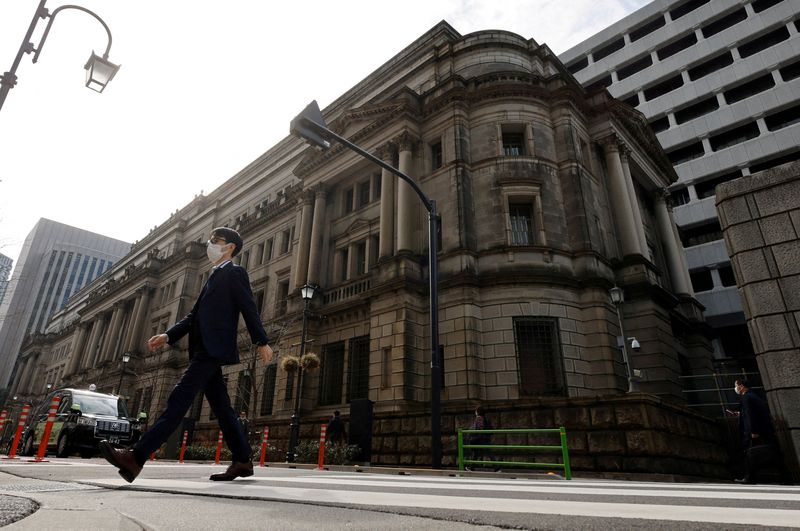By Leika Kihara and Tetsushi Kajimoto
TOKYO (Reuters) - Japanese manufacturers' sentiment soured in the first quarter to its worst level in more than two years, eclipsing an uptick in service-sector mood, a central bank survey showed, reinforcing views a strong post-COVID economic recovery is some time away.
Corporate inflation expectations hit a fresh high with firms projecting inflation to stay above the Bank of Japan's 2% target five years ahead, the "tankan" showed on Monday.
The outcome underscores the tricky task awaiting incoming Bank of Japan (BOJ) Governor Kazuo Ueda in deciding how soon to phase out his predecessor's massive stimulus programme.
While steady wage growth and an end to COVID-19 curbs may keep the economy on a solid footing, slowing global growth could derail the export-reliant recovery, analysts say.
"External factors will continue to weigh on business morale in coming months" as the global economy slows under the weight of U.S. and European monetary tightening, said Takeshi Minami, chief economist at Norinchukin Research Institute.
"Given the fragile nature of Japan's recovery, the BOJ is not in a situation where it can normalise monetary policy anytime soon," he said.
The headline index measuring big manufacturers' sentiment fell to plus 1 in March from plus 7 in December, the tankan showed, worse than a median market forecast for a reading of plus 3. It was the fifth straight quarter of deterioration and the worst level hit since December 2020.
Sentiment soured for a broad sector of manufacturers with many firms complaining of the impact of rising raw material and fuel costs, as well as slowing overseas growth and slumping chip demand, a BOJ official told a briefing.
By contrast, big non-manufacturers' index rose for a fourth quarter to plus 20 from plus 19 in December, as hopes of a rebound in tourism and service demand brightened morale among retailers and hotels.
But service-sector firms expect business conditions to worsen three months ahead, the tankan showed, as rising raw material and labour costs cloud the outlook.
The survey will be among key data the BOJ will scrutinise in producing fresh quarterly growth and inflation estimates at its April 27-28 meeting - the first one to be chaired by Ueda.
Japan's economy narrowly averted a recession in the final three months of 2022 and analysts expect any rebound in the January-March quarter to have been modest, as slow wage growth and rising living costs hurt consumption.
Many big firms promised hefty pay rises in spring wage talks with unions, offering policymakers hope that consumption will recover and take up the slack from an expected slump in exports.
The tankan showed big firms plan to raise capital expenditure by 3.2% in the fiscal year that began in April, which analysts see as bullish given it follows a hefty 16.4% gain in the previous year.

The strength of the economy, as well as wage and inflation outlook, will be key to how soon the BOJ could tweak or end its bond yield control policy that has been criticised as distorting market pricing and hurting financial institutions' margin.
Companies expect inflation to hit 2.8% a year from now, 2.3% three years from now and 2.1% five years from now, the survey showed in a sign firms are bracing for inflation to remain above the central bank's 2% target for years to come.
